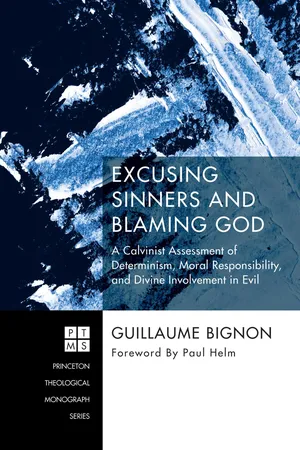![]()
Part I
Calvinism and Moral Responsibility
The first of these two grand arguments to be reviewed is the claim that Calvinism is incompatible with moral responsibility. Though the argument can take a number of shapes, it is at bottom a deductive one of the sort:
1. If Calvinism is true, people are never morally responsible for their choices and actions.
2. At least some people, at some time, are morally responsible for some of their choices or actions.
Therefore
3. Calvinism is false.
The argument is logically valid, so that if both premises are true, the conclusion follows, and Calvinism stands refuted. One way to avoid the conclusion would be to reject premise (2); indeed, the denial of moral responsibility is a route taken by the so-called “hard determinists,” but I take it that premise (2) is a firm commitment of orthodox Christianity, so I will not (and Calvinists should not) employ that way out of the argument. No Calvinist committed to the truth of scripture should reject the belief that (at least some) people are morally responsible for (at least some of) their sins. Thus, all the focus of the present work with respect to this argument will reside on premise (1). Is it the case that Calvinism entails the impossibility of moral responsibility? Let us note that the feature of Calvinism that allegedly excludes moral responsibility is its theological determinism. Premise (1) can thus be split into two steps as follows:
1a If Calvinism is true, then determinism is true.
1b If determinism is true, then people are never morally responsible for their choices and actions.
2 At least some people, at some time, are morally responsible for some of their choices or actions.
Therefore
3a Determinism is false. (Follows from (1b) and (2))
Therefore
3b Calvinism is false. (Follows from (1a) and (3a))
The logical validity is still unobjectionable. This refined analysis now theoretically permits a Calvinist to evade the force of the argument by rejecting (1a) in asserting that determinism is not essential to Calvinism. But as was supposed as a matter of definition, whether it be physical determinism or theological determinism, a Calvinist must affirm some form of determinism, which means that premise (1a) is unobjectionable, because it does not specify which variety of determinism is in view. Given this, all the debate now lies on whether premise (1b) is true.
Premise (1b) is the infamous thesis of incompatibilism. It is the claim that determinism is incompatible with moral responsibility. Accordingly, the discussion of the present anti-Calvinist grand argument calls for the resolution of the so-called “compatibility question,” a long-standing controversy in the history of metaphysics: is determinism incompatible with moral responsibility? Yet as we endeavor to do so, we must be careful to approach it in its proper dialectical context: that of an objection to Calvinism. Premise (1b) as we encounter it is a premise in an argument against Calvinism. In order for this objection to fail, it is therefore not necessary at this point for Calvinists to prove the premise false (that is, to prove compatibilism). The burden of proof is squarely on the shoulders of the non-Calvinist objector presently making the argument. It may be useful for Calvinists to prove the premise false (and we will surely assess whether this can be done), but it is not necessary in order for the argument to be shown to fail. The modest task of the Calvinist facing this argument is to review all the arguments that non-Calvinists have to offer in support of premise (1b), and show that they have no purchase on him. To this review we now turn.
![]()
1
Free will, pets, and puppets
The “no free will / no choice” argument
What then can be said in support of incompatibilism? A first attempt at supporting the thesis would be to say that if determinism is true, then humans “do not have free will”; they do not “make their own choices.” As Hugh McCann puts it, “people unspoiled by philosophy are often inclined to believe that if determinism is true, we never ‘really’ get to decide anything.” And how could we be morally responsible without a choice and without free will? If anything is ever ground for excusing a failure, it is surely the absence of free choice. As to the Calvinist rejection of “free will,” there is even decent ground in the writings of the reformers to document the charge: all one needs to do is to pick up Martin Luther’s Bondage of the Will to know how he felt about “free will,” that “empty term whose reality is lost.” But surely, if humans have no free will, they are not morally responsible; how could they be?
Framed this badly, however, the incompatibilist contention is easily put to rest by exposing a handful of equivocations. By the above claims, the objector must mean something like the following:
4. If determinism is true, then humans make no choice.
5. If humans make no choice, then they are not morally responsible.
Therefore
6. Determinism is incompatible with moral responsibility.
Or
7. If determinism is true, then humans have no free will.
8. If humans have no free will, then they are not morally responsible.
Therefore
6. Determinism is incompatible with moral responsibility.
To serve as a cogent argument against Calvinism, these claims must show that “free will” or “choice,” as they are necessarily rejected by Calvinists, are in fact necessary for moral responsibility. But both of these expressions are still equivocating with respect to the metaphysical assumptions that they package. If by “choice” in premises (4) and (5) the objector means “libertarian free choice” and by “free will” in premises (7) and (8) he means “liber...
